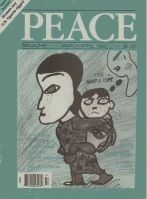
Peace Magazine Mar-Apr 1992, page 22. Some rights reserved.
Search for other articles by Johan Galtung here
In Yugofax, December 1991
Germany and the rest of the European Community have recognized the independence of Croatia-not in the name of peace but in the interests of a common foreign policy. So peace will not be achieved, and the long-awaited move will cause the situation to deteriorate.
The principle of self-determination within existing borders is relatively unproblematic for Slovenia, which is also to be recognized, but the Croatian situation is different.
Politicians, journalists, and regular people in Western Europe seem unaware of their deeply embedded anti-Serbian bias. The Cold War pattern is automatically projected onto Yugoslavia; East is communist and bad; West is democratic and good. This bias is reinforced by centuries of prejudice against Orthodox Serbs under Ottoman rule with their Cyrillic script in favor of Catholic Croats under Austro-Hungarian rule with their Latin letters. The moves to recognition have been fueled by those prejudices and represent a continuation of the East-West (Cold) War that many people, particularly in peace and civil society movements, thought was over.
Recognition will transform internal administrative borders in Yugoslavia into international ones, converting the complex civil war there into a war of aggression by Serbia on Croatia. This change is more likely to add arms, rather than peacekeepers, to the scene. Is Serbia in for an attack by a German-led-coalition, with Security Council legitimacy and guaranteed access through Hungary? In Slobodan Milosevic, has the West perhaps found a new international bogey, a spot vacant since the Gulf War?
These international alignments enforced by recognition will solve nothing because the whole construction of the war as a conflict between Serbia and Croatia is wrong. The agendas and pressure points behind the conflict include Greater Serbian demagogues, Hungarian, Albanian and Muslim advocates in Vojvodina, Kosovo and Bosnia-Herzegovina, and of course the 600,000 to 1 million Serbs in Croatia. (The higher estimate may represent Serbs in Croatia afraid to identify their nationality.) The Yugoslav federal army consists of up to 85% Serbs from outside Serbia, motivated by obvious historical fears. So while recognition is broadly seen as a move against Belgrade, as much as it may be intended as a move for Zagreb, Belgrade's actual control of the conflict is anything but firm.
No wonder Serbs in Croatia have declared themselves independent, already creating their own ministries. They could hardly be expected to accept written guarantees by a government that has abolished their rights as Serbs, much like Belgrade wrongly abolished the 1974 autonomy of Hungarians and Albanians. The recognition of Croatia may convince these Serbs that they have no alternative but to fight to the end. That instinct will be amplified by propaganda.
Facing a German-EC-Catholic alliance, Serbs in general feel pushed against a wall. Their Orthodox neighbors to the East are either EC members (Greece), antagonists over Macedonia (Bulgaria) or impotent Romania). They see their only hope for protection in peacekeeping forces from the United Nations, possibly stationed in Serbia rather than Croatia, nominally to protect Hungarians, Albanians and Muslims against Serbs but in their view protecting Serbs against a possible German-led coalition.
Finally, recognition may become a forum, after the dismal accomplishments of the Hague, for the EC to demonstrate foreign policy clout and military muscle even before the 1998 fusion with the Western European Union. The Yugoslav crisis is being dealt with, not as a crisis to solve, but as raw material for experimentation toward constructing a European Union superpower.
Is there an alternative? Buy peace with time. Blue Helmets should be deployed throughout Yugoslavia. Such a move could give the people there -and not just the ruling politicians -some years to sort this mess out.
Johan Galtung is an acclaimed peace researcher, now at the University of Hawaii

Peace Magazine Mar-Apr 1992, page 22. Some rights reserved.
Search for other articles by Johan Galtung here